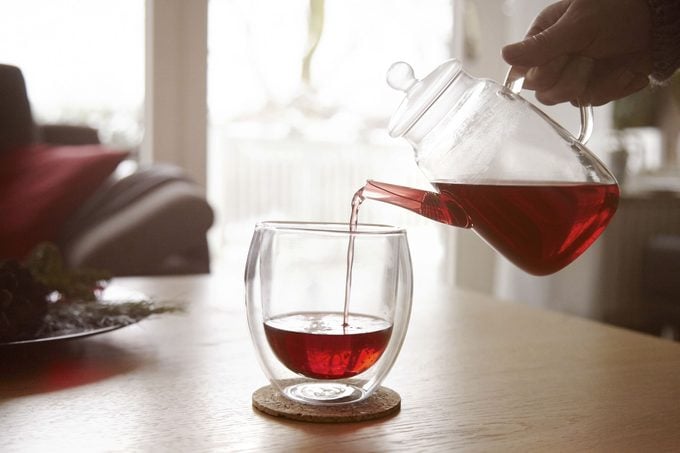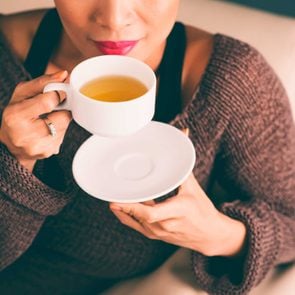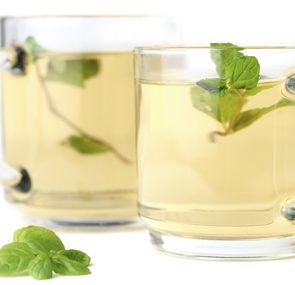6 Rooibos Tea Benefits That Could Make It Worth Trying
Updated: Jun. 29, 2022
This tea has been around for centuries, but experts are now finding that there are some potential health benefits of rooibos tea.
Our editors and experts handpick every product we feature. We may earn a commission from your purchases.

Rooibos—pronounced “ROY-boss”—tea has been a popular beverage in Africa for centuries. Also known as red tea or red bush tea, the drink comes from a plant indigenous to the western coast of South Africa. People make the tea by crushing the leaves of a shrub called Aspalathus linearis. Red rooibos tea is fermented and has a sweetish honey taste and a rich red hue. Green rooibos is greenish brown and has an almost bitter, grassy flavor that is similar to green tea. Both red and green rooibos teas are caffeine free. (Here’s what happens to your body when you drink tea every day.)
To make rooibos tea, seep a half teaspoon of the leaves in eight ounces of boiling water for five or six minutes. The tea will taste stronger and slightly bitter the longer you steep it, but it also releases more antioxidants as it sits. Experts aren’t certain if adding milk or soy milk to rooibos tea has any negative effects, but a study published in the European Journal of Nutrition found that adding dairy and soy to green tea decreased the bioavailability of antioxidants. So it’s probably best to proceed with caution before adding milk or soy if you are looking for rooibos tea benefits.
The history of rooibos tea benefits
Botanists first identified rooibos tea in 1772, but it wasn’t until 1968 that Dr. Annique Theron discovered it could calm and soothe her allergy-prone, colicky baby. Dr. Theron would soon become known as South Africa’s “Mother of Rooibos,” says Adele du Toit, a spokesperson for the South African Rooibos Council. Du Toit credits Dr. Theron with putting the spotlight on rooibos tea benefits.
“Since Dr. Theron’s discovery, countless South African women have come to rely on the rare and unique herb for almost every ailment under the sun,” says Du Toit. “Whether it’s having to soothe sunburn, calm a colicky baby, deal with breakouts or breakups, rooibos has been at the top of nearly every women’s go-to remedy.”
Anti-inflammatory
Rooibos tea benefits include reducing inflammation, which may help people with aches and pains, and could also be beneficial for people with autoimmune conditions like rheumatoid arthritis. Other research, including a study of rats published in 2014 in PLoS One, suggests that the antioxidant-rich rooibos may also help protect against stress-related free radicals, which play a role in neurodegenerative diseases like Alzheimer’s, Parkinson’s and Huntington’s. (However, animal and cell research does not always have the same results in humans.)
“Although antioxidants are associated with a multitude of health benefits, the exact amount of antioxidant that needs to be consumed and the method of consumption that is optimal is unknown,” says Carolyn Newberry, MD, a gastroenterologist at New York-Presbyterian Hospital and Weill Cornell Medicine in New York City. “Overall, a balanced diet that consists of a variety of plants and lean proteins should be encouraged. If you like herbal teas, rooibos tea can be a part of this balanced diet.”
Find out more about the power of antioxidants in tea here.
Antihistamine
Rooibos tea is rich in healthy bioflavonoids such as quercetin, a plant pigment found mostly in onions grapes, berries, cherries, broccoli, and citrus fruits. These block the release of histamines that cause seasonal allergy symptoms like sinus congestion, watery eyes, and hay fever. A review of studies published in 2016, in Pharmacognosy Review, found that quercetin blocks mast cells from releasing histamine.
Anti-aging
“When your body is healthy, that is highly reflected in your largest organ, your skin,” says Doris Day, MD, a board certified dermatologist in New York City and author of Beyond Beautiful: Using the Power of Your Mind and Aesthetic Breakthroughs to Look Naturally Young and Radiant. “Inflammation is known to increase many destructive processes in the skin, notably free radical formation, which can accelerate skin aging and even, over time, lead to skin cancer. Using appropriate measures to limit inflammation can help the skin optimize its own natural processes of repair and rejuvenation, helping you look your best at every age.”
A powerful anti-inflammatory? Rooibos, especially green rooibos, may help combat aging, according to a study in laboratory-grown cells that was published in 2019 in Journal of Functional Foods. Credit the tea’s abundance of antioxidants, which “can help protect cells from damage,” says Dr. Newberry. (Here are natural remedies that can help slow down aging.)

Skin protection
Rooibos tea has antibacterial compounds, as well as vitamins and minerals such as fluoride, iron, manganese, magnesium, zinc, calcium, vitamin D, and potassium, which may help improve skin texture, quality, health, and elasticity. People with acne and eczema sometimes find that rooibos tea helps improve their skin conditions.
“It’s all in the formulation and concentration,” says Dr. Day. “There is science to the ingredient and it could be developed to have benefits for the skin, topically, orally, alone, or in combination with other ingredients.”
Weight control
Rooibos may help you lose weight—and not just because it’s low in calories (one cup has around 2.5 calories). Proponents claim that drinking rooibos can help fight off hunger between meals. A study published in a 2014 issue of Phytomedicine that looked at laboratory-grown fat cells suggested fermented rooibos tea may increase levels of leptin, the hormone that sends signals to the brain that you’re full. Naturally honey-flavored and sweet, rooibos tea can also help satisfy cravings and may be a good substitute for sugary drinks. (Learn about 10 nighttime habits that can make you gain weight.)
Blood sugar
Unfermented rooibos contains aspalathin, a flavonoid that may have glucose-lowering effects according to at least one study in mice published in Phytomedicine. It’s possible rooibos may benefit people with type 2 diabetes.
Potential side effects
While side effects from drinking rooibos tea are rare, there are several cases of people suffering liver damage when they drank numerous cups a day. Some research suggests that certain compounds in rooibos could raise estrogen levels, so people with hormone-sensitive conditions like breast cancer may want to avoid the beverage. Researchers aren’t sure if the tea is safe for women who are pregnant, so use caution. It’s not a bad idea to talk to your doctor before trying the tea.
And if rooibos tea isn’t right for you, try one of these other superfoods healthy women should add to their diet.




